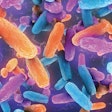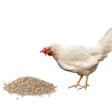
If you are "the One,” then you can thrive outside the matrix, but if you are like any other good animal feed additive in the world, chances are your days are few if you do not enter the matrix. No, not the movie, The Matrix, but the feed composition matrix that exists in every feed formulation system.
Consider for a moment the feed additive phytase. Is it an additive or an indispensable ingredient? The answer is simple. If the user forces this ingredient into the feed formula by applying a fixed inclusion rate, then it is an additive. If the feed formulation software picks up phytase because it provides phosphorus less expensively than phosphates, then it has become an indispensable ingredient. Today, phytase is used in most diets worldwide because it has entered the “matrix.” In other words, the phytase effect.
Is it an additive or an indispensable ingredient?
This is the dream of most modern feed additives; that is, to become like phytase, an additive that no longer needs the user’s hand to enter feed formulations. Is it simple and easy like in the case of phytase? Perhaps not, but it is not impossible, either. Some feed additive suppliers are working hard to get matrix values for their products; others are not aware of the impending danger. That danger being the return of antibiotics or something that will replace them with the same high efficacy and low cost. But how can this be done?
A simple example is that of organic acids. Today, we add organic acids based on our education. Some nutritionists add more, others less. If we were to use a matrix value that would relate to the organic acid concentration in the feeds, then this process would become quantified instead of being a qualitative process. For example, we could use the rather undervalued Acid Binding Capacity index and ask the computer to meet a certain minimum using organic acids, if needed. Again, an oversimplification, as there are so many available organic acids, but it serves to illustrate the purpose.
So, even if your product is Neil of Matrix fame, it would not hurt to get it a place in the feed matrix, just in case Mr. Smith, the Matrix antibiotic, shows up again. Ah, and do watch the movie — it is highly recommended!















